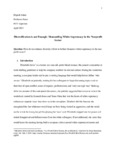Diversification is not Enough: Dismantling White Supremacy in the Nonprofit Sector

View/
Author
Suber, Elspeth Stuart
Subject
Washington and Lee University, Shepherd Poverty Program
Race discrimination
Diversity in the workplace
Performative (Philosophy)
Metadata
Show full item recordDescription
Capstone; [FULL-TEXT FREELY AVAILABLE ONLINE] Elspeth Stuart Suber is a member of the Class of 2021 of Washington and Lee University. The term white supremacy connotes extremist organizations like the Ku Klux Klan for many Americans, but white supremacist norms and characteristics are often salient much closer to home. Merriam Webster defines white supremacy as "the social, economic, and political systems that collectively enable white people to maintain power over people of other races." For example, the colleagues that would likely ostracize a Black woman for bringing up the ideas Elizabeth shared in the company culture meeting are acting under the social control of white supremacy. Non-profits claiming that 'diversity' is valued but refusing to hire more than a few token employees of color is white supremacy. Many modern companies and organizations, including "do-good" non-profit and social service organizations, are structured to internally replicate white supremacy. This organizational design determines fundamental elements like how power is held and by whom, who makes decisions and how decisions are carried out, what the relationship of the organization is to monetary resources, and what constitutes success, effectiveness, purpose, etc. Strict hierarchies of authority are enforced, usually with white, heterosexual, well-compensated men on boards, in executive positions, or otherwise at the top. An organizational structure built around white supremacy is not conducive to true 'diversity,' 'equity,' and 'inclusion,' even if the organization does hire a few token people of color. Dismantling the white supremacist organizational structure should be the true goal of all nonprofit organizations. To do so they must deeply reckon with the salience of tokenism, silencing, performativity, perfectionism, and white saviorism embedded in their organizational culture. [From Literature Review section] Elspeth Suber